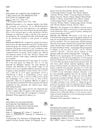 19 citations,
May 2020 in “Cells”
19 citations,
May 2020 in “Cells” Substance from human umbilical cord blood cells promotes hair growth.
 18 citations,
January 2011 in “Bioorganic & Medicinal Chemistry Letters”
18 citations,
January 2011 in “Bioorganic & Medicinal Chemistry Letters” New hybrid compound found to effectively prevent hair loss.
 17 citations,
June 2012 in “European journal of medicinal chemistry”
17 citations,
June 2012 in “European journal of medicinal chemistry” New steroid compounds effectively inhibit 5α-reductase and may treat hair loss.
 16 citations,
August 2014 in “Archives of Pharmacal Research”
16 citations,
August 2014 in “Archives of Pharmacal Research” Special nanoparticles increased skin absorption of hair loss treatments with fewer side effects.
 13 citations,
November 2012 in “PubMed”
13 citations,
November 2012 in “PubMed” 5α-reductase inhibitors may worsen sexual drive and spontaneous erections but don't worsen existing erectile or ejaculatory problems.
 11 citations,
July 2008 in “European Journal of Drug Metabolism and Pharmacokinetics”
11 citations,
July 2008 in “European Journal of Drug Metabolism and Pharmacokinetics” Finasteride helps reduce pain and inflammation in animals.
 10 citations,
August 2020 in “International Journal of Andrology”
10 citations,
August 2020 in “International Journal of Andrology” 5α-reductase inhibitors like finasteride may not be effective or safe for transgender individuals, and more research is needed.
 10 citations,
May 2018 in “Neuropharmacology”
10 citations,
May 2018 in “Neuropharmacology” Drugs for hormone-related conditions might help treat mental disorders but could have serious side effects.
 9 citations,
November 2019 in “Scientific reports”
9 citations,
November 2019 in “Scientific reports” The AC 2 peptide from Trapa japonica fruit helps protect hair cells and may treat hair loss.
 9 citations,
January 2014 in “Medical Hypotheses”
9 citations,
January 2014 in “Medical Hypotheses” Higher DHT in male baldness may protect against prostate cancer.
 7 citations,
January 2017 in “Biological & Pharmaceutical Bulletin”
7 citations,
January 2017 in “Biological & Pharmaceutical Bulletin” Certain compounds from Panax ginseng can block proteins that affect hair growth, potentially helping treat hair loss.
 6 citations,
March 2015 in “Journal of Endocrinological Investigation”
6 citations,
March 2015 in “Journal of Endocrinological Investigation” Taking both finasteride and dutasteride for prostate issues may raise the risk of heart problems.
![Synthesis and In Vitro Study of 17β-[N-Ureylene-N,N′-Disubstituted]-4-Methyl-4-Aza-5α-Androstan-3-Ones as Selective Inhibitors of Type I 5α-Reductase](/images/research/d19df8a7-8de6-4430-8a0d-4ffa1f502985/small/15608.jpg) 5 citations,
February 1997 in “Bioorganic & Medicinal Chemistry”
5 citations,
February 1997 in “Bioorganic & Medicinal Chemistry” New compounds were made that effectively block a specific enzyme related to androgen conditions.
 4 citations,
August 2019 in “General and Comparative Endocrinology”
4 citations,
August 2019 in “General and Comparative Endocrinology” Male yak hair growth is influenced by DHT synthesis, which is promoted by 5α-red1 and AR during growth phases, while E2 may inhibit growth through ERα.
 3 citations,
July 2021 in “Drug Testing and Analysis”
3 citations,
July 2021 in “Drug Testing and Analysis” 5α-reductase inhibitors can interfere with doping tests by masking banned substances.
 3 citations,
January 1994 in “Toxicological Sciences”
3 citations,
January 1994 in “Toxicological Sciences” Finasteride causes abnormal growth in male mice cells at high doses.
 June 2018 in “The Journal of Sexual Medicine”
June 2018 in “The Journal of Sexual Medicine” Finasteride does not negatively affect male reproductive function.
 August 1994 in “Journal of dermatological science”
August 1994 in “Journal of dermatological science” Cyclosporin A and FK506 can start new hair growth in mice, but ascomycin and rapamycin cannot.
 June 2021 in “Archives of Advances in Biosciences”
June 2021 in “Archives of Advances in Biosciences” Finasteride reduces sperm count and quality and alters hormone levels in mice.
 January 2020 in “Química Nova”
January 2020 in “Química Nova” The PW91 method is best for calculating the basic physical and chemical properties of Finasteride, a drug used for prostate issues and hair loss.
 223 citations,
December 2010 in “The Journal of Sexual Medicine”
223 citations,
December 2010 in “The Journal of Sexual Medicine” Some patients taking finasteride or dutasteride may have ongoing sexual problems and depression even after stopping the medication.
 71 citations,
November 2012 in “Expert Opinion on Drug Safety”
71 citations,
November 2012 in “Expert Opinion on Drug Safety” 5-alpha reductase inhibitors can cause sexual side effects like erectile dysfunction and reduced sexual desire, sometimes lasting after stopping the drug.
 70 citations,
August 1995 in “Fertility and Sterility”
70 citations,
August 1995 in “Fertility and Sterility” Finasteride reduces hairiness and androgen levels in women with unexplained excessive hair growth.
 66 citations,
April 2017 in “International Journal of Andrology”
66 citations,
April 2017 in “International Journal of Andrology” Men taking 5α-reductase inhibitors for enlarged prostate have a higher chance of experiencing reduced sexual desire and erectile dysfunction.
 57 citations,
July 2016 in “The Journal of Sexual Medicine”
57 citations,
July 2016 in “The Journal of Sexual Medicine” 5α-reductase inhibitors increase the risk of sexual dysfunction, especially in men with enlarged prostate.
 50 citations,
March 2017 in “PeerJ”
50 citations,
March 2017 in “PeerJ” Using finasteride or dutasteride may cause long-lasting erectile dysfunction.
 34 citations,
February 1992 in “The Journal of Clinical Endocrinology and Metabolism”
34 citations,
February 1992 in “The Journal of Clinical Endocrinology and Metabolism” Finasteride and minoxidil together promote hair growth better than either alone.
 33 citations,
May 2013 in “Andrologia”
33 citations,
May 2013 in “Andrologia” Some herbs show promise as antiandrogenic agents.
 33 citations,
October 1994 in “The Journal of Clinical Endocrinology and Metabolism”
33 citations,
October 1994 in “The Journal of Clinical Endocrinology and Metabolism” Finasteride reduces hair growth and is safe for women with excessive hair.
 32 citations,
June 2017 in “Journal of Pharmaceutical Sciences”
32 citations,
June 2017 in “Journal of Pharmaceutical Sciences” Chitosan-coated nanoparticles improve skin delivery of hair loss treatments with fewer side effects.













![Synthesis and In Vitro Study of 17β-[N-Ureylene-N,N′-Disubstituted]-4-Methyl-4-Aza-5α-Androstan-3-Ones as Selective Inhibitors of Type I 5α-Reductase](/images/research/d19df8a7-8de6-4430-8a0d-4ffa1f502985/small/15608.jpg)
















